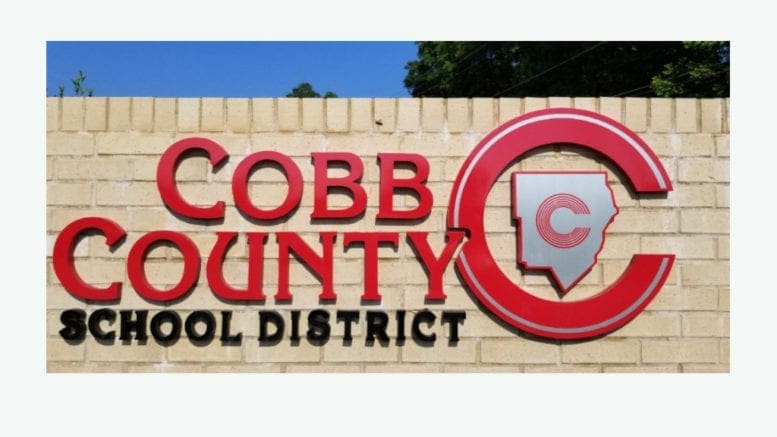By Rebecca Gaunt
Cobb County School District maintained its accreditation but was given one year to make improvements by Cognia.
One of the big takeaways from the accrediting firm’s report – the division on the board is hindering its ability to lead.
The special review has been a source of contention for stakeholders since it was sparked by letters from the three Democratic board members and 50 members of the staff and the public, alerting the firm to the ongoing disaccord.
The following is a summary of the complaints about the board to Cognia:
- Exhibit a lack of understanding regarding their roles and responsibilities.
- Do not demonstrate collegiality with respect to their differences or work cohesively to promote student achievement and the success of the district.
- Do not adhere to a Code of Ethics regarding board conduct during board of education meetings.
- Do not adhere to ethical practices for fiscal oversight.
- Make decisions that seem unethical, discriminatory, or inhumane.
- Are not communicating transparently to staff and community stakeholders on issues of current importance and related decisions. For example, the Board has not been responsive to requests for discussions about items related to teacher and staff support and safety improvements during the coronavirus (COVID-19) pandemic.
- Have not been responsive to requests for discussions related to the study and expansion of targeted literacy interventions based on data about student performance.
The special review team investigated the complaints by conducting 179 remote interviews that included the seven board members and superintendent, executive and district-level leaders, staff, and community members. It also reviewed board meetings, work sessions, local news articles, and evidence provided by the district.
Cognia investigated the district with regard to four performance standards. Performance on each standard is evaluated on the following scale:
- Insufficient (red) Identifies key areas that need more focused improvement efforts.
- Initiating (yellow) Represents areas to enhance and extend current improvement efforts.
- Improving (green) pinpoints quality practices that meet the standards.
- Impacting (blue) Demonstrates noteworthy practices producing clear results that exceed expectations.
Of the four standards investigated, CCSD was rated as “initiating” for three and “improving” for one.
Standard 1.4 Effective Policies
Rated: Initiating
The review team indicated it was concerned by board policy changes made with little time for members to review the impact of the changes.
It specifically pointed to the change made requiring the agreement of four members, rather than three, to add an item to the agenda for discussion. This has effectively given the four current Republican board members, who made the change, control of the agenda.
The three Democrats said they have been silenced and Cognia concurred.
The report states, “The new policy also grants the board chairperson a great deal of authority in determining the items that may be discussed and voted on by the Board and lessens the ability of board members to represent their stakeholders.”
Directives for improvement from Cognia include systematically reviewing and revising policies, and participating in professional development on “Robert’s Rules of Order” to gain clarity about the role of the chairperson and fellow board members when conducting meetings.
Standard 1.5 Ethics
Rated: Initiating
The team reviewed the social media accounts of board members and deemed some comments harmful. The report referenced a post referring to the board chairperson’s comment about not knowing what Critical Race Theory means as being “embarrassing” and a call to “be on notice and take as many screenshots as you feel necessary; we won’t be silenced, nor intimidated.” An issue of the Grapevine newsletter, which is created by Vice Chairman David Banks, was also listed as causing concern.
An email sent by a board member was deemed “inappropriate or ethically questionable” because it contained misinformation regarding COVID-19.
The report also pointed to the criticism of colleagues in a Chairman’s Brief video.
The review team pinpointed the meeting with the policy change that removed board member comments as “a pivotal point in creating conflict among board members.”
Evidence submitted by the school district to Cognia stated that it was “aware” of 30 potential policy violations by Charisse Davis, 60 violations by Jaha Howard, 12 violations by Tre’ Hutchins, and one violation by David Banks when communicating with traditional media.
The district’s submission also reported that Davis had potentially violated social media policy 10 times, Howard 51, and Hutchins once.
The district further stated that it was not aware of violations by Brad Wheeler, David Chastain, Randy Scamihorn or David Banks, though it acknowledged the existence of Banks’ newsletter and Scamihorns’ Chairman’s Brief videos.
The school district’s submitted report does not mention Banks’ history of incendiary emails, sent from both his personal and official email accounts, that have been a source of complaints for years, or the recorded phone call a parent made of Scamihorn earlier this year.
Cognia instructed the board to “review the Code of Ethics to develop, implement, and monitor a plan of accountability to ensure adherence of all board members in effectively and efficiently executing their established roles and responsibilities” with help from an external authority.
Standard 2.1 Equity
Rated: Improving
The review found that the district provided ample evidence of academic achievement in the form of test scores and graduation rates. The district also provides multiple programs to “challenge and accelerate student learning.”
Though the aggregate data submitted by the district showed student success, “little evidence was presented that supported the disaggregation of student data in comparing performance by schools and by subgroups.”
Careful analysis revealed achievement gaps when considering demographics such as race and income.
During interviews, when asked if subgroup data are shared with the board or public, internal stakeholders told interviewers, “We are afraid to, because it would immediately show up in the media.” Another stakeholder discussed a “culture of only talking about what we are doing best.”
The report notes an instance during a board meeting of a member raising the issue of student performance differences, requesting the issue be added to the agenda. The chairperson responded that “he would take it under advisement because he thought the Board talked about academics at most meetings already.”
Cognia recommended using a formalized process to analyze disaggregated data to identify the needs of different groups and to allocate resources equitably.
Standard 3.8 Fiscal Responsibility
Rating: Initiating
The district has been rewarded for excellent financial reporting by the Government Finance Officers Association (GFOA) and the Association of School Business Officials (ASBO) Certificate of Excellence in Financial Reporting every year since 1984.
The report also nods to a history of voters approving education SPLOST referendums, which it refers to as “an indication of trust” from stakeholders.
However, the decision-making process that resulted in the $12 million purchase of UV lights and sanitizing stations, the accessibility issues of CTLS, which received an $8.1 million upgrade, and the hiring of Taylor English Law Firm without soliciting bids, came into question.
Directives from Cognia included analyzing data and communicating with stakeholders before making decisions, and monitoring “board actions regarding fiduciary matters.”
A progress monitoring review will be scheduled in the next 12 months.
Per the report: The Cobb County School District (CCSD) is currently the second-largest public school district in Georgia with 111 schools and approximately 107,000 students. This district serves as the largest employer in Cobb County with over 17,000 employees, of which 65 percent of teachers have advanced degrees. The district reports the student demographics as 34.9 percent Caucasian, 30.6 percent Black, 23.9 percent Hispanic, 6 percent Asian, and 4.7 percent as other.
Read the full Cognia report at this link.
Read the district’s submissions to Cognia here and here.

Rebecca Gaunt earned a degree in journalism from the University of Georgia and a master’s degree in education from Oglethorpe University. After teaching elementary school for several years, she returned to writing. She lives in Marietta with her husband, son, two cats, and a dog. In her spare time, she loves to read, binge Netflix and travel.

Sounds like Cobb should spend the next year finding a different accrediting agency since Cognia seems to be delving into politics now.